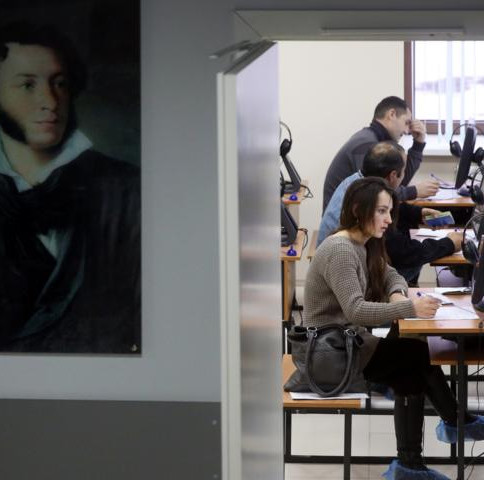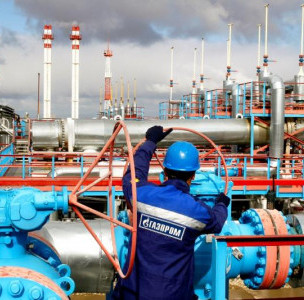
The United Nations Security Council held a meeting to discuss Ukraine as Kiev’s forces step up their lethal attacks on civilian targets; Florida Governor Ron DeSantis’ withdrawal from the US presidential race gives a major boost to former President Donald Trump’s chances of sweeping the Republican primaries; and China is increasingly competing with the US in Latin America, which Washington has traditionally deemed its exclusive "backyard." These stories topped Tuesday’s newspaper headlines across Russia, according to TASS News Agency.
Izvestia: UN Security Council meets on Ukraine as Kiev steps up attack on civilian targets
The US and its allies will continue to provide weapons to Kiev despite the Ukrainian army’s use of Western-made ammunition in strikes on civilians, said experts interviewed by Izvestia. On January 22, the UN Security Council held a meeting at Russia’s request, which took place right after another Ukrainian terrorist attack on civilians in Donetsk. Foreign Minister Sergey Lavrov represented Russia at the meeting.
Moscow’s mission to the UN announced plans to hold an extraordinary meeting on the Ukraine issue a few days after residential areas in the borderline Russian city of Belgorod had come under fire on December 30. The Ukrainian attack killed at least 25 civilians and left over 100 wounded. Just one day before the top Russian diplomat’s address to the UN, the Ukrainian armed forces carried out a strike on an open-air market in Donetsk. According to the latest reports, 27 civilians were killed and 30 suffered wounds. Lavrov pointed out that Kiev’s Western sponsors were largely to blame for these developments.
According to UN estimates, more than 14,000 civilians have been affected by the conflict since February 2022 and at least 10,000 have been killed. However, experts emphasize that the fact that Ukrainian forces are using Western weapons to launch attacks on civilians will not give the US and its allies any pause nor will it cause them to cease providing lethal assistance to Kiev. "We should not expect the West to recognize its mistakes and change its behavior," Vladimir Bruter, an expert with the International Institute for Humanitarian and Political Studies, said.
Kiev will continue to receive military support as the West’s proxy because the West still has no intention of conceding to Russia on the battlefield, Alexey Fenenko, professor with the Department of International Security at Moscow State University’s Faculty of World Politics, stressed. Experts point out that the West is interested in resolving the conflict in Ukraine, but only under a scenario where Kiev remains fully capable of carrying out strikes against Russia.
Media: DeSantis quits race as Trump gallops ahead toward clinching Republican nomination
Now that Florida Governor Ron DeSantis has announced his withdrawal from the race for the Republican Party nomination for this November’s US presidential election, former President Donald Trump and former South Carolina Governor and US Ambassador to the UN Nikki Haley remain the only two GOP presidential hopefuls standing. The two rivals will go head-to-head on January 23 when the bellwether state of New Hampshire holds its first-in-the-nation Republican primary election, Vedomosti writes.
Pavel Dubravsky, political strategist and head of Dubravsky Consulting, sees Trump’s advantage in the fact that his electoral base is similar to that of DeSantis. The Florida governor’s supporters view Haley as part of the party establishment that both Trump and DeSantis have opposed. So far, Trump is regarded as the favorite in the upcoming primaries, the political strategist stressed. "Haley has a chance of achieving a good result but she will hardly beat the ex-president," Dmitry Suslov, deputy director of the Center for Comprehensive European and International Studies at the Higher School of Economics (HSE University), pointed out.
DeSantis’ decision to pull out of the race is highly likely to mean that the party establishment that bet on him has given up on finding a viable "Never Trump" alternative contender and accepted that Trump is the only possible candidate. "The party has gone Trumpist. The credit goes to Trump himself as he has been working hard with the party for two years," Vladimir Vasilyev, senior research fellow at the Russian Academy of Sciences’ Institute for US and Canadian Studies, told Nezavisimaya Gazeta.
"Trump’s opponents can now only hope for a miracle, wishing for Haley to give him a fight and win. The New Hampshire primary will show whether those hopes are justified. If the bet on Haley fails, there will be no way to stop Trump but to get rid of him in a non-political way, that is, through a court ruling. However, it’s very dangerous because the entire political system may break down," Vasilyev noted. The expert believes there is a distinct possibility that the Democrats may try to find a replacement for President Joe Biden at the top of their party ticket, as the incumbent chief executive and his administration’s favorability ratings continue to sink in public opinion polls. Or, they may move to dump unpopular incumbent Vice President Kamala Harris in favor of a fresh face with a higher popularity rating in the No. 2 spot as Biden’s running mate, who could well end up being president should the 81-year-old Biden win re-election. Such desperate electoral stratagems by the Democratic Party establishment would not come without major risks, but there seem to be no risk-free ways left to bring Trump down.
Nezavisimaya Gazeta: China increasingly competing with US in Latin America
Chinese Foreign Minister Wang Yi’s visit to Jamaica and Brazil is a sign of the practical implementation of Beijing’s strategy for expanding commodity imports from Latin America and enhancing its political influence in the region, Nezavisimaya Gazeta writes.
Jamaica was the last stop on Wang’s ten-day tour of Africa and Latin America. The trip, which began in Egypt on January 13, also included Tunisia, Togo, Ivory Coast and Brazil. China’s top diplomat always visits Africa at the beginning of the year. This time, Brazil and Jamaica were added to his itinerary. American experts point out with irritation that Beijing’s diplomatic activity is aimed at undermining Washington’s position on the South American continent, over which it once proclaimed exclusive suzerainty under the Monroe Doctrine, which stipulated that the countries of the "Old World" must not meddle in Washington’s Latin American "backyard." While China is certainly not an Old World nation, it has grown so powerful that its presence in the region is becoming dangerous for US interests.
Andrey Karneyev, head of the School of Asian Studies at the Higher School of Economics (HSE University), notes that, "in its policies, China pays much attention to the countries of the Global South." "Beijing believes that it can rely on them in case of increasing tensions with the US, Japan and the European Union. It is an important means of strengthening Beijing’s positions in terms of foreign policy and trade. Particularly because the West is lagging far behind China regarding the size of investment in infrastructure projects in the Third World. This also goes for Latin America. Notably, the newly elected Argentinian president, [Javier Milei], who is pro-American, initially planned to cut economic ties with China but later changed his mind," the expert explained.
Alexander Lukin, research director at the Russian Academy of Sciences’ Institute of China and Contemporary Asia, says that Being is betting on South America’s economic heavyweights such as Brazil. As for political influence, China has consistently said that it does not interfere in the domestic affairs of other countries. Unlike the Americans, Beijing does not have a program for "defending democracy," which also makes the Chinese preferable partners for most countries in Latin America.
Vedomosti: EU devises new mechanism to keep military aid flowing to Ukraine
Budapest will not participate in funding a new European Union compensation fund for weapons supplies to Kiev, nor in making such supplies itself, Hungarian Foreign Minister Peter Szijjarto said, thereby confirming a Wall Street Journal report of Brussels’ new plan to provide military assistance to Ukraine, Vedomosti writes.
Officials have not yet commented on the EU’s new initiative. However, according to the WSJ, the EU’s External Action Service has developed a plan to create a new fund worth $22 bln to provide military aid to Kiev. It will absorb the funds of the European Peace Facility (EPF), which paid compensation to the countries sending weapons and ammunition to Ukraine. The practice actually stopped in 2023 due to disagreements between EU members and the exhaustion of weapons stocks in some countries. The new fund is also expected to pay compensation to the nations helping Kiev, while its structure will make it possible to avoid the type of regular payments that Hungary used as a lever to put pressure on Kiev.
The EU is forced to establish new funds because of uncertainty about the future of US policy toward Ukraine, said Andrey Kortunov, academic director of the Russian International Affairs Council (RIAC). Brussels is seeking to create mechanisms that would be as independent as possible from the existing state of affairs, he pointed out. With every EU member currently capable of blocking such decisions single-handedly, Brussels’ desire to create a reserve within an autonomous fund - preferably based on an existing one - is logical and understandable. "These measures cannot be taken without bargaining and compromises. There will be debate about individual contributions; additional EU spending and other conflicts are possible. At this point, Kiev can expect financial aid from rich EU donors such as Germany and France, among others," the expert emphasized.
EU countries still have resources left to support Ukraine, said Denis Denisov, an expert at the Financial University under the Government of the Russian Federation. However, a growing number of EU members are becoming cautious about providing assistance to Kiev, showing fatigue with the ongoing Ukraine conflict, Denisov noted. According to him, the high level of corruption in Ukraine is one of the reasons. In addition, more and more people in EU countries are coming to think that further support for Kiev is not a good idea. "However, it doesn’t mean that support will stop all of a sudden. There will be ways to get around dissenters like Hungary," the expert concluded.
Vedomosti: Southeast Asia may become key market for Russian coal exports
Russian companies boosted coal supplies to Southeast Asian countries by 47% in 2023, Vedomosti writes, citing data from analytical firm Kpler. In particular, Vietnam, Malaysia and Indonesia ramped up Russian coal imports.
Russian coal supplies to Southeast Asia are rising as companies are redirecting exports to new markets following the European Union’s embargo. According to Kpler statistics, Russia also increased coal exports to China, India and Turkey in 2023. In total, Asia’s share in Russian coal exports grew from 84% in 2022 to 95% in 2023, while Europe’s share dropped from 11% to 1%, Kpler data shows.
Kirill Rodionov, an independent energy expert, believes that demand for thermal coal is most likely to rise in China and India, while demand for coking coal will grow the most in India. The country lags far behind China in terms of the level of urbanization, which is why it will increase the consumption of steel.
As for Southeast Asia, most countries there are actively developing the coal energy sector so the region looks very promising for the export of power-generating coal, Finam analyst Yelena Yushkova pointed out. Indonesia purchases energy from Russia to compensate for the lost volumes on a number of markets, particularly in Europe, which is why the country’s domestic production may be insufficient to meet its own needs, the expert explained. According to Yushkova’s estimates, Russia can export coal to almost all Southeast Asian nations as its low cost allows exporters to offer a discount of up to 50% from the market price. The analyst believes that Russian supplies to the region this year may grow by 10% compared to 2023.
TASS is not responsible for the material quoted in these press reviews









